Maxim Litvinov
Maxim Maximovich Litvinov, Russian pronunciation: [mɐˈksʲim mɐˈksʲiməvʲɪtɕ lʲɪˈtvʲinəf]; born Meir Henoch Wallach-Finkelstein (17 July 1876 – 31 December 1951) was a Russian revolutionary and prominent Soviet Bolshevik politician.
Maxim Litvinov Макси́м Литви́нов | |
|---|---|
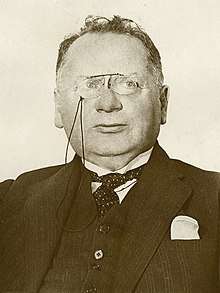 Litvinov in 1932 | |
| Soviet Ambassador to the United States | |
| In office 10 November 1941 – 22 August 1943 | |
| Premier | Vyacheslav Molotov Joseph Stalin |
| Preceded by | Konstantin Umansky |
| Succeeded by | Andrei Gromyko |
| In office 1918–1919 | |
| Premier | Vladimir Lenin |
| Preceded by | Boris Bakhmeteff |
| Succeeded by | Ludwig Martens |
| People's Commissar for Foreign Affairs of the Soviet Union | |
| In office 21 July 1930 – 3 May 1939 | |
| Premier | Joseph Stalin |
| Preceded by | Georgy Chicherin |
| Succeeded by | Vyacheslav Molotov |
| Personal details | |
| Born | Meir Henoch Mojszewicz Wallach-Finkelstein 17 July 1876 Białystok, Russian Empire |
| Died | 31 December 1951 (aged 75) Moscow, Russian SFSR, Soviet Union |
| Nationality | Soviet |
| Political party | RSDLP (1898-1912) Russian Communist Party (1912-1951) |
| Profession | Diplomat, civil servant |
A strong advocate of diplomatic agreements leading towards disarmament, Litvinov was influential in making the Soviet Union a party to the Kellogg–Briand Pact of 1928 and was chiefly responsible in 1929 for adoption of the so-called Litvinov Protocol, a multilateral agreement bringing Kellogg-Briand into force between the Soviet Union and a number of neighboring states. In 1930, Litvinov was named as People's Commissar of Foreign Affairs, the top-ranking diplomatic position in the Soviet state.
During the subsequent decade, Litvinov emerged as a leading voice for the official Soviet policy of collective security with the Western powers against Nazi Germany.[1]
Early life and first exile
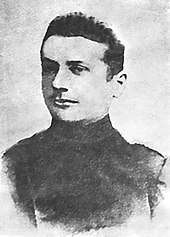
Meir Henoch Wallach was born into a wealthy Lithuanian Jewish banking family in Białystok, Grodno Governorate of the Russian Empire, formerly part of the Polish–Lithuanian Commonwealth, he was the second son of Moses and Anna Wallach. He joined the Russian Social Democratic Labour Party (SDLP) in 1898 at which time the party was considered an illegal organization, and it was customary for its members to use pseudonyms. He changed his name to Maxim Litvinov (a common Litvak surname), but was also known as Papasha and Maximovich. Litvinov also wrote articles under the names M.G. Harrison and David Mordecai Finkelstein.[2]
His early responsibilities included carrying out propaganda work in the Chernigov Governorate. In 1900, Litvinov became a member of Kiev party committee, but the entire committee was arrested in 1901. After 18 months of captivity, he led an escape of 11 inmates from Lukyanovskaya prison and lived in exile in Switzerland, where he was an editor for the revolutionary newspaper Iskra.
In 1903, he joined the Bolshevik faction and returned to Russia. However, the most important event in 1903 for the advancement of Litvinov's political career was meeting Lenin in the British Library.[3]
Lenin and Litvinov went to Hyde Park to hear some of the speeches, and continued to remain in touch during this pre-revolutionary period.[4]
After the 1905 Revolution, he became editor of the Russian Social Democratic Labour Party (SDLP)'s first legal newspaper, Novaya Zhizn (New Life), in St. Petersburg.
Second emigration
When the Russian government began arresting Bolsheviks in 1906, Litvinov left the country and spent the next ten years as an émigré and arms dealer for the party. Based in Paris, he travelled throughout Europe, sometimes posing as a procurement officer from Ecuador, buying rifles in Belgium, Germany and the Austro-Hungarian empire. Despite some notable disasters, such as the wrecking of a gun running yacht on the Romanian coast, he had some success in smuggling these arms into Russia via Finland and the Black Sea.[5]
In 1907, he attended the 5th Congress of the Russian Social Democratic Labour Party in London. Initially he had to rely on the charity of the Rowton Houses for accommodation in London. However, the party eventually arranged a rented house for him that he shared with Joseph Stalin, who had also been anxious to find more comfortable housing than the Rowton poor hostels. [6][7]
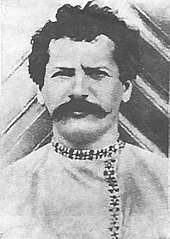
In 1908, he was arrested under the name Meer Wallach by French police while carrying twelve 500-ruble banknotes that had been stolen from a bank in Tiflis during the 1907 Tiflis bank robbery that took place on 26 June 1907.[8] Litvinov was deported from France and he went to Belfast in Ireland where he joined his sister Rifka and her family.[9] There, he taught foreign languages in the Jewish Jaffe Public Elementary School until 1910.[10] He then moved to England and lived in London, where he was active in the International Socialist Bureau.
When war broke out in 1914, the Tsar requested that all Russian émigrés who were in England and liable for Russian military service be returned to fight in the Russian army. However Litvinov did not return as he was able to convince the English officer who interviewed him that if he returned to Russia he would be tried rather than fight in the army.[11]
Litvinov regularly spoke in public opposing the war, but failed to face up to the fact that if Britain had not declared war, it would have broken a treaty to defend Belgium.[12] At the pinnacle of his power in the 1930s, Litvinov constantly stressed the importance of abiding by the terms of treaties.[13]
He addressed the conference of the Entente Labour Parties but they were not persuaded to change course:
While holding the olive branch in one hand, we have to hold the sword in the other. We have been forced to take up the sword as the only means of defence. We must not forget we are able to assemble here because the Royal Navy hold the high seas and millions of Allied troops hold the line. If Germany was to succeed, the resolutions we pass would be a mere scrap of paper and of no more value than the Russian bank notes of the Russian state bank.[14]
Later, a mutiny took place on a Russian ship in the Mersey. The police having been warned of possible trouble had the ship under surveillance, and when shouts were heard that the crew were threatening to kill their officers, the ship was boarded and the crew were arrested. Shortly before the mutiny a police report confirmed that Litvinov had received the sailors very well.[15] Therefore, at best, Litvinov had failed to try to dissuade the sailors from carrying out the mutiny or condemn it, and at worst, encouraged it.[16]
Litvinov was also seeking interview with British, American, Australian and Canadian soldiers and inculcating them with Bolshevik ideas, as well as inducing British and American soldiers of Jewish descent to carry on propaganda in their regiments. There was an occasion in which thirty Royal Engineers, along with some American and Canadian soldiers, were received in Litvinov’s office. It was assumed that Litvinov was similarly encouraging them to state their grievances.[15]
In England, Litvinov met and in 1916 married Ivy Low, the daughter of a Jewish university professor.[17]
Diplomat of the 1920s
On the day after the October Revolution of 1917, Litvinov was appointed by the Council of People's Commissars (Sovnarkom) as the Soviet government's plenipotentiary representative in Great Britain.[17] His accreditation was never officially formalised, and his position as an unofficial diplomatic contact was analogous to that of Bruce Lockhart, Britain's unofficial agent in Soviet Russia.[18]
Litvinov was still allowed to speak freely even after the treaty of Brest-Litovsk between Germany and Russia which took Russia out of the war.[19]
In January 1918, Litvinov addressed the Labour Party Conference by praising the achievements of the Revolution:
The land has been given to the peasants. The factories are under the supervision of their shop steward committees. Superfluous apartments of the rich have been made available to provide shelter for the homeless. The banks have been nationalised, and in short, a nationalisation policy has been carried out in all the services of the community. The Army has been democratised and self-determination has been guaranteed to all nationalities of Russia.
He then appealed to the Conference with these words:
The Russian worker has been fighting an unequal battle against the imperialists of all the world for democratic principles honestly applied. They have begun the proceedings for a general peace, but it is obvious they cannot finish it alone. I would say to the representatives of British Labour, 'Speed up your peace.'[20]
Kerensky, the Russian leader of the democratic Government that replaced the Tsar and was overthrown by Lenin, was welcomed by the British Government on a visit to London and addressed the Labour Party Conference by criticising the dictatorship of Lenin’s government:
They have dispersed the Constituent Assembly, abolished freedom of speech, have made human life the easy prey of every red guardsman, have destroyed the liberty of the elections, even in the Councils of the Workmen, that have made an end of all institutions of self-government that have been elected by universal suffrage. The Bolsheviks claim that the present state of Russia is a dictatorship of the proletariat, although the most ruthless repression is applied against the democratic and socialist parties. War has been organised against the helpless population and every Russian citizen who refuses to recognise this method of government as perfect is declared counter-revolutionary.[21]
In the left-wing English press, Litvinov criticised Kerensky with these words:
The continuance of the government in time of Revolution, for eight months without a standing army, except voluntary detachments, without police and press censorship and indeed with greater freedom of speech and the press than exists in any other country immediately disproves allegations to the contrary. Kerensky and his friends, having convinced themselves of the futility of any counter-revolutionary revolts in Russia, are now coming abroad to seek foreign military intervention for the overthrow of the Soviets under the pretext of fighting Germany. Further, if Kerensky is successful in overthrowing the Bolshevik regime, it will not be replaced by a socialist or even a democratic government but by the most brutal and barbaric military dictatorship resting on foreign bayonets, with the inevitable restoration of Tsarism.[22] Clearly, the reception given to Kerensky indicated that the vast majority of the British Labour movement believed that a safer route to improve the prosperity of the working class was through the parliamentary route rather than by revolution."[23]
Later in 1918, Litvinov was arrested by the British government, ostensibly on a charge of having addressed public gatherings held in opposition to British intervention in the ongoing Russian Civil War.[17] Litvinov was held until exchanged for Lockhart, who had been imprisoned similarly in Russia.[17]
Following his release, Litvinov returned to Moscow, arriving there at the end of 1918.[17] There, he was appointed to the governing collegium of the People's Commissariat of Foreign Affairs (Narkomindel) and immediately dispatched on an official mission to Stockholm, Sweden, where he presented a Soviet peace appeal.[17] Litvinov was subsequently deported from Sweden, but spent the next months as a roving diplomat for the Soviet government, helping to broker a multilateral agreement allowing the exchange of prisoners of war from a range of combatants, including Russia, Great Britain, and France.[17] This successful negotiation amounted to de facto recognition of the new revolutionary Russian government by the other signatories to the agreement and established Litvinov's importance in Soviet diplomacy.[17]
However, Litvinov undoubtedly tried to intervene in Britain's internal politics agreeing at the request of the Daily Herald, a newspaper supporting the Labour Party, to ask the Soviet government to give it financial assistance[24] saying:
If we do not support the Daily Herald, which is now passing through a fresh crisis, the paper will have to turn to a Right trade union. On Russian questions it acts as if it is our organ. After Lansbury’s journey to Moscow earlier in the year, the Herald has moved considerably to the Left and decidedly advocates direct action in support of the Soviet regime. It needed £50,000 in six months, after which once again it hoped to be on firm ground. I beg for an early and favourable answer because there is no hope of establishing a purely Communist newspaper at this time.[25]
In view of the publicity caused by the leak, the money was never accepted by the Daily Herald.[26][27]
In March 1921, a trade agreement was negotiated between the Soviet Government and British Government permitting trade between the two countries making trade lawful so that gold sent to Britain to pay for goods could not be confiscated. However, immediately after the agreement was signed, the British Government and even more the British press began to complain about Communist propaganda. Finally, the British Foreign Secretary sent a note of protest to the Soviet Government, charging it with responsibility for intrigues against the British Government.[28] Litvinov replied:
The British Foreign Office has been misled by a gang of professional forgers and swindlers, and had it known the dubious sources of its information, its note of 7 September would never have been produced. The British Government's complaints of anti-British activities in India, Persia, Turkistan, Angora and Afghanistan to a certain extent are based on the above-mentioned fictitious reports and speeches, but the Russian Government wishes to state most emphatically that, after the conclusion of the Anglo-Russian agreement, it had given strict instructions to its representatives in the East to abstain from any anti-British propaganda. True to the principle of self-determination, the Soviet Government and its representatives exercise the greatest respect for the independence of the Eastern countries in giving up the privileges and concessions forcibly extorted from them by the Tsarist Government.
The Russian Government, on its part, feels compelled to place on record that the attitude of the British Government has lately been far from friendly towards Russia.
The imprisonment by British authorities in Constantinople of a number of Russian trade agents and their expulsion without any charge having been preferred against them, the co-operation with the French Government in the so-called ‘Russian question’, the continued support given to French schemes tending to frustrate every effort on behalf of various countries and international bodies to bring some help to the famine-stricken population of Russia, and lastly the presentation of the British note itself of 7 September with its grave charges based merely on imaginary facts and unchecked loose information obtained from dubious sources at a time when France was inciting Poland and Rumania to make war on Russia, do not belong to the category of facts that would induce the Russian Government to believe that it is the sincere desire of the British Government to foster friendly relations between the governments and peoples of the two countries.[29]
In 1921, Litvinov was appointed First Deputy People's Commissar of Foreign Affairs, second in command to People's Commissar Georgy Chicherin (1872–1936).[17] Although both were unflinchingly loyal to the Soviet regime, Litvinov and Chicherin proved to be temperamental opposites and ultimately emerged as rivals. Chicherin was cultivated and polished in personal style and taste, but held a strongly anti-Western political orientation. He sought to hold Soviet Russia aloof from diplomatic dealmaking with capitalist powers.[17] As diplomatic historian Jonathan Haslam has observed, Litvinov was precisely the reverse: less erudite and more coarse, but willing to deal in good faith with the West for peace and a breathing space for Soviet Russia to pursue its own internal development.[17]
In 1924, full diplomatic relations had been restored under the Macdonald Labour Government.[30] The Conservative Party and the business community continued to be hostile to the Soviet Union partly because the Soviet Union had not honoured the Tsarist Debts and partly because of the fear of Bolshevism spreading to Britain, and considered that therefore the Bolshevist Government should be militarily overthrown.[31] This was exacerbated by the Soviet Government supporting the 1926 General Strike and criticising the British TUC for calling off the strike. The Soviet Government offered a gift of £25,000 to the TUC which was refused and £200,000 to the Cooperative movement which was accepted.[32]
However, Litvinov was still anxious to prevent this deterioration of relations and suggested that he should have talks with Hodgson; Britain's chargé d'affaires in Moscow. Hodgson who privately was sympathetic to some of Litvinov’s complaints communicated with the Foreign Office in the following terms. He gave four reasons for criticising Britain's position:
In the first place we had signed a trade agreement as long ago as 1921 and in 1923 we went a step further by conferring on the Soviet Government de jure recognition.
Secondly, it be known upon several occasions in the past six months that HM Government have every intention of maintaining its relationship with the Soviet Government unless the latter do something quite intolerably offensive.
Third, the outbursts of enthusiasts carried away by their legitimate emotions are liable to prejudice our position in dealing with problems which, being in relation with the Soviet Government, we have to solve by discussion with that Government.
Fourth, the Soviet Union whatever her political complexion, is a market and we badly need markets. The red bandit battle cry may conceivably serve a useful purpose in the political warfare at home. On this question I can offer no opinion. I can, however, lay it down as a proposition that in so far as our relations with Russia are concerned, the expressions of resentment which it epitomises are definitely detrimental to our essential interest. That we should be alarmed at the activity of Soviet agitators is an admission of weakness which is hailed with delight over here.
Yet the most pressing aspect is the commercial one and here the anti-red campaign does positive and immediate harm which it is impossible to calculate in Pounds Sterling. It creates a policy of insecurity which makes the Soviet Government hesitant about placing orders in Britain, causes British firms to fight shy of Russian orders and frightens British banks from financing them.[33]
Nevertheless, under pressure from Conservative MP's on the uncorroborated evidence of a dismissed employee that the Soviet Trade Mission had stolen a missing war office document[34] the Conservative Government successfully asked Parliament to sever diplomatic relations with the Soviet Union.[35]
Although Chicherin advocated caution, the British Government and the Narkomindel have responded to Britain in a conciliatory manner to mollify the moderate Conservatives in the Cabinet.[36] Litvinov, presumably with Stalin’s support, decided to go on the attack:
The decision was no surprise to the Soviet Government. It had already for long been aware that a rupture of diplomatic relations with the Union of Soviet Socialist Republics was being prepared by the whole policy of the present British Conservative Government, which has declined all proposals of the Soviet Government for the settlement of mutual relations by means of negotiations. The lack of results of the search of the Trade Delegation premises, which was carried out with utmost thoroughness over several days, is the most convincing proof of the loyalty and correctitude of the official agents of the Union of Socialist Soviet Republics. The Soviet Government passes over with contempt the insinuations of a British Minister regarding espionage by the Trade Delegation and considers it beneath its dignity to reply to them. The Soviet Government places on record that the British Government had no legitimate ground for a police raid on the extra-territorial premises of the official Soviet agent.[37]
Hodgson, the British chargé d'affaires, agreed with Litvinov that the Argos Raid was deplorable. He said so in a letter to the Times fourteen years later in 1941 showing his pleasure at Litvinov’s appointment as ambassador of the United States.[38]
When the Labour Party were the largest party in the 1929 British General election, Macdonald who became Prime Minister set about restoring relations with the Soviet Union provided the Soviet Union refrained from initiating propaganda in Britain.[39] Whereas Litvinov was in favour of being conciliatory we now know from published letters between Stalin and Molotov, that Stalin decided to overrule Litvinov’s conciliatory attitude[40] having the result that British Foreign Secretary Henderson, instead of trying to come to an effective agreement on propaganda, papered over the cracks so in effect achieved unconditional recognition.[41]
Litvinov was a strong supporter of the principle of disarmament and favored Soviet participation in the Kellogg-Briand Pact of 1928, which pledged signatories to the elimination of the use of war as a tool of foreign policy—a position directly at odds with that advocated by his nominal superior, Chicherin.[17] He was frustrated by the failure of the Kellogg Pact's signatories to ratify the treaty. So he proposed the Litvinov Protocol, in which signatories formally proclaimed themselves in mutual compliance with the pacifistic goals of the Kellogg-Briand Pact. It was signed in Moscow in February 1929 by the Soviet Union, Poland, Romania, Latvia, and Estonia, and later by several other countries.
He was also an enthusiastic supporter and actively attended the Preparatory Commission of the Disarmament Conference from 30 November 1927 until it was replaced by the actual disarmament Conference in 1932 advocating total Disarmament.[42]
Boncour, the French politician criticised such proposals saying;
Supposing you had total disarmament; if there was no international organisation taking charge of security, if you had no international force to ensure the maintenance of this security, if you had no international law such as we are endeavouring to lay down here, a powerful and populous nation would always have the power when it wished to do so on a small nation equally disarmed, less populous and less well equipped to resist an attack which might be made upon it.[43][44]
Litvinov’s answer was;
Would small nations be less insecure after their powerful neighbours who have disarmed than they are now when, in addition to economic, financial, territorial and other superiorities possessed by the great powers, the latter also enjoy the immense advantage of greater armaments.[45]
However, the proposals despised by most of the delegates to the Disarmament Conference[46] won Litvinov favourable publicity in radical circles in the Western countries eager for disarmament and which were already impatient at the slow progress of the commission.[47]
The national joint Council of the Labour Party, the Parliamentary Labour Party and the Trades Union Congress passed a resolution expressing their sense of great importance of the proposals of general and simultaneous disarmament which was put forward by the USSR delegation at the Preparatory Disarmament Commission in Geneva on 30 November 1927.[48]
People's Commissar of Foreign Affairs
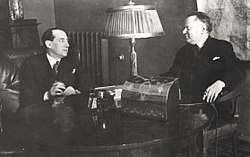
In 1930, Joseph Stalin appointed Litvinov People's Commissar for Foreign Affairs. A firm believer in collective security, Litvinov worked very hard to form a closer relationship with France and the United Kingdom, a policy seemingly at odds with the "class against class" line of the so-called Third Period being advocated by the Communist International.[49] Litvinov remained the only leading official of Narkomindel in the mid-1930s who had direct personal access to Stalin and who could deal with Stalin's inner circle on terms approaching equality, in marked contrast to other top foreign affairs officials such as Litvinov's protégé Boris Stomonyakov and rival Nikolay Krestinsky, for whom access was limited to the level of occasional supplication.[49]
Stalin was largely detached from and uninterested in foreign policy throughout the first half of the 1930s, largely leaving the general operations of Narkomindel and the Comintern to their designated chiefs.[49] This left Litvinov with fairly wide latitude to pursue policy objectives subject only to broad review and approval from the centre, with Stalin frequently delegating even that aspect of leadership to members of his personal secretariat, including Karl Radek, until the summer of 1936.[49] As a result, Litvinov's Narkomindel was able to pursue a moderate foreign policy line, emphasising stable relations between governments leading towards general disarmament, which was, as one historian has called it, a "curious mismatch" with the revolutionary militance then vocalised by the Comintern.[49]
In 1933, Litvinov was instrumental in winning a long-sought diplomatic plum: formal diplomatic recognition by the United States of the Soviet government. US President Franklin Roosevelt sent comedian Harpo Marx to the Soviet Union as a goodwill ambassador. Litvinov and Marx became friends and even performed a routine on stage together.[2] Litvinov also actively facilitated the acceptance of the Soviet Unuin into the League of Nations, where he represented his country from 1934 to 1938.
In 1935, Litvinov negotiated treaties of mutual assistance with France and with Czechoslovakia with the aim of containing Nazi Germany's aggression.[1]
Negotiations regarding Germany and dismissal
After the Munich Agreement, German media derided Litvinov about his Jewish ancestry, referring to him as "Finkelstein-Litvinov."[50] The Western democracies’ policy of appeasement led the Soviet Union to reorient its foreign policy towards a rapprochement with Germany.[1]
On 3 May 1939, Stalin replaced Litvinov, who was closely identified with the anti-German position,[1] with Vyacheslav Molotov.[51] That night, NKVD troops surrounded the offices of the Commissariat of Foreign Affairs.[51] The phone at Litvinov's dacha was disconnected and, the following morning, Molotov, Georgy Malenkov, and Lavrenty Beria arrived at the commissariat to inform Litvinov of his dismissal.[51] After Litvinov's dismissal, many of his aides were arrested and beaten, evidently in an attempt to extract compromising information.[51]
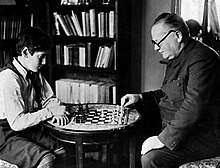
The replacement of Litvinov with Molotov significantly increased Stalin's freedom to maneuver in foreign policy.[52] The dismissal of Litvinov, whose Jewish ethnicity was viewed disfavorably by Nazi Germany, removed an obstacle to negotiations with Germany.[53] Stalin immediately directed Molotov to "purge the ministry of Jews."[50][54] Recalling Stalin's order, Molotov commented, "Thank God for these words! Jews formed an absolute majority in the leadership and among the ambassadors. It wasn't good."[54]
Given Litvinov's prior attempts to create an anti-fascist coalition, association with the doctrine of collective security with France and Britain, and pro-Western orientation by Kremlin standards, his dismissal indicated the existence of a Soviet option of rapprochement with Germany.[55] Likewise, Molotov's appointment was a signal to Germany that the USSR was open to offers.[55] The dismissal also signaled to France and Britain the existence of a potential negotiation option with Germany. One British official wrote that Litvinov's disappearance also meant the loss of an admirable technician or shock-absorber, while Molotov's "modus operandi" was "more truly Bolshevik than diplomatic or cosmopolitan."[56]
With regard to the signing of a German-Soviet nonaggression pact with secret protocols dividing eastern Europe three months later, Hitler remarked to military commanders that "Litvinov's replacement was decisive."[53] A German official told the Soviet Ambassador that Hitler was also pleased that Litvinov's replacement, Molotov, was not Jewish.[57] Hitler also wrote to Mussolini that Litvinov's dismissal demonstrated the Kremlin's readiness to alter relations with Berlin, which led to "the most extensive nonaggression pact in existence."[58] When Litvinov was later asked about the reasons for his dismissal, he replied by asking, "Do you really think that I was the right person to sign a treaty with Hitler?"[59]
American historian Jeffrey Herf views Litvinov's dismissal and the Molotov–Ribbentrop Pact as conclusive proof that the Nazi belief in a Jewish conspiracy that supposedly controlled the governments of the Soviet Union and other allied powers was completely false.[60]
Ambassador to the United States and latter
Following his dismissal as head of Narkomindel, Litvinov was dispatched to Washington, D.C., to serve as the Soviet Union's Ambassador to the United States.
Like Churchill, Litvinov had misgivings about the Munich Agreement. Following the Nazi invasion of the Soviet Union on 22 June 1941, Litvinov said on a radio broadcast to Britain and the United States: "We always realized the danger which a Hitler victory in the West could constitute for us."
After returning to Soviet Union, Litvinov became deputy minister for foreign affairs. He was dismissed from his post after an interview given to Richard C. Hottelet on 18 June 1946 in which he expressed a belief that war between the West and the Soviet Union was inevitable.[61]

Death and legacy
There have been rumours indicating Litvinov was murdered on Stalin's personal instructions to the MVD. According to Anastas Mikoyan, a truck deliberately collided with Litvinov's car as it rounded a bend near to the Litvinov dacha on New Year's Eve 1951, and he later died of his injuries. British television journalist Tim Tzouliadis stated: "The assassination of Litvinov marked an intensification of Stalin's anti-Semitic campaign.".[62] However, according to Litvinov's wife and daughter, Stalin was still on good terms with him at the time of his death. He had serious heart problems and was given the best treatment available during the final weeks of his life, which ended in a heart attack on 31 December 1951.[63]
After Litvinov's death, his widow remained in the Soviet Union until she returned to live in Britain in 1972.
In his reminiscences dictated to a supporter when he was an old man, Litvinov's replacement as chief of foreign affairs and right-hand man of Joseph Stalin, Vyacheslav Molotov, remembered Litvinov as "intelligent" and "first rate" but declared that Stalin and he "didn't trust him" and consequently "left him out of negotiations" with the United States during the whole war.[64]
Molotov declared Litvinov "not a bad diplomat—a good one" but proclaimed him "quite an opportunist" who "greatly sympathized with Trotsky, Zinoviev, and Kamenev."[64] "Litvinov remained among the living [in the Great Purge] only by chance," Molotov declared.[64]
Litvinov's grandson Pavel Litvinov, a physicist, writer and Soviet-era dissident, resides in the United States.
See also
- Foreign relations of the Soviet Union
- Soviet–German relations before 1941
Footnotes
- "Maksim Litvinov". Encyclopaedia Britannica.
- Block, Maxine ed. (1941) Current Biography. pp. 518–520. ISBN 978-9997376671
- Holroyd-Doveto, p. 2
- Pope, Arthur (1943). Maxim Litvinov. L.B. Fischer. p. 51.
- Rappaport, pp. 136–137.
- Geoffrey Howse (2005). Foul Deeds and Suspicious Deaths in London's East End. Casemate. p. 25.
- Rappaport, p. 144.
- "Alleged Nihilists Arrested in Paris," New York Times.
- Jonathan Hamill, "The Red Under Our Bed," Old Belfast 9, 3 August 2011. https://issuu.com/glenravel/docs/oldbelfast9/24
- "Belfast: 10 Little Known Facts from the Quirky to Downright Unbelievable," Belefast Telegraph.
- Holroyd-Doveto, p. 8
- Holroyd-Doveto, p. 10
- Degras, Jane. Soviet Documents on Foreign Policy vol 3 (Speech, 1 July 1936). pp. 194 196–198.
- "Times". Times. 24 February 1918.
- Foreign Office Document FO/371/3299 p. 52
- Holroyd-Doveto, p. 26
- Haslam, Jonathan (1983) Soviet Foreign Policy, 1930–33: The Impact of the Depression. New York: St. Martin's Press. pp. 11–13. ISBN 0312748388
- Lockhart, R. H. Bruce (2008). Memoirs of a British Agent. Read Books. p. 203. ISBN 978-1-4437-8151-0.
- Holroyd-Doveton, John (2013). Maxim Litvinov: A Biography. Woodland Publications. pp. 22–35.
- "Labour Leader". 24 January 1918: 5. Cite journal requires
|journal=(help) - "Labour Conference Report". 1918: 60. Cite journal requires
|journal=(help) - "Herald". 6 July 1921: 14. Cite journal requires
|journal=(help) - Holroyd-Doveton, John (2013). Maxim Litvinov: A Biography. Woodland Publications. p. 33.
- Holroyd-Doveton, John (2013). Maxim Litvinov: A Biography. Woodland Publications. p. 200.
- "Times pg.10". 19 August 1920.
- "Daily Herald pg 1". 15 September 1920.
- Lansbury, George. Miracle of Fleet Stret. p. 147.
- Holroyd-Doveton, John (2013). Maxim Litvinov A Biography. Woodland Publications. p. 202.
- "Command Papers". Command Papers 1869 Letter No.1: 3. 30 March 1923.
- Holroyd-Doveton, John (2013). Maxim Litvinov: A Biography. Woodland Publications. p. 206.
- Holroyd-Doveton, John (2013). Maxim Litvinov: A Biography. Woodland Publications. pp. 37, 45.
- Holroyd-Doveton, John (2013). Maxim Litvinov: A Biography. Woodland Publications. pp. 210–211.
- "Foreign Office Document". FO / 371 / 11187: Page 81.
- Northbridge & Wells. Britain and Soviet Communism: The Impact of a Revolution. pp. 70–71.
- "Hansard". Vol 206, 26 May 1927: 2195–2326.
- O'Connor, Timothy. Diplomacy and Revolution. p. 154.
- "Foreign Office Document". FO / 371 / 2895: Pages 71-72.
- "The Times". 11 November 1941.
- Holroyd-Doveton, John (2013). Maxim Litvinov: A Biography. Woodland Publication. p. 218.
- Lih, Lars. Stalin's Letters to Molotov. pp. 174 No.44.
- DBFP, 2nd Series Vol 7. pp. 34-35 No.22.
- Holroyd-Doveton, John (2013). Maxim Litvinov: A Biography. Woodland Publications. p. 102.
- "Paul Boncour Speech, Preparatory Minutes, Series 5": Pg 13-14. Cite journal requires
|journal=(help) - "Pg 16". The Times. 1 December 1927.
- Coates, W.P. Russia's Disarmament Proposals. p. 30.
- Holroyd-Doveton, John (2013). Maxim Litvinov: A Biography. Woodland Publications. p. 108.
- Carr, Edward. The Russian Revolution from Lenin to Stalin. p. 174.
- "Labour Party Conference Report - 1928". Pg 31.
- Haslam, Jonathan (1984). The Soviet Union and the Struggle for Collective Security in Europe, 1933–1939. New York: St. Martin's Press. pp. 52–53. ISBN 9780333300503
- Herf, Jeffrey (2006) The Jewish Enemy: Nazi Propaganda During World War II and the Holocaust. Cambridge, MA: Harvard University Press. pp. 97–98. ISBN 0674027388
- Nekrich, p. 109
- Resis, p. 47
- Nekrich, p. 110
- Resis, p. 35
- Resis, p. 51
- Watson, Derek (2000). "Molotov's Apprenticeship in Foreign Policy: The Triple Alliance Negotiations in 1939". Europe-Asia Studies. 52 (4): 695–722 (698–699). doi:10.1080/713663077. JSTOR 153322.
- Brackman, Roman (2001) The Secret File of Joseph Stalin: a Hidden Life. London: Frank Cass. pp. 333–334. ISBN 0714684023
- Nekrich, p. 119
- Israeli, Victor (2003) On the Battlefields of the Cold War: A Soviet Ambassador's Confession. University Park, PA: Penn State Press. p. 110. ISBN 0271022973
- Herf, Jeffrey (2006). The Jewish Enemy: Nazi Propaganda during the World War II and the Holocaust. Harvard University Press. p. 56. ISBN 978-0-674038-59-2.
- Chuev, Felix (1993) Molotov Remembers. Albert Resis, trans. Chicago: Ivan R. Dee. pp. 6. ISBN 9781566630276
- Tzouliadis, Tim (2009) The Forsaken: From the Great Depression to the Gulags: Hope and Betrayal in Stalin's Russia. London: Abacus. pp. 306–307. ISBN 9780748130313
- Haslam, Jonathan (2011) Russia's Cold War: From the October Revolution to the Fall of the Wall. New Haven, CT: Yale University Press. p. 75. ISBN 9780300159974
- Chuev, Felix (1993) Molotov Remembers. Albert Resis, trans. Chicago: Ivan R. Dee. pp. 67–69. ISBN 9781566630276
Sources
- Holroyd-Doveton, John (2013). Maxim Litvinov: A Biography. Woodland Publications. ISBN 978-0957296107.
- Nekrich, Alexander; Ulam, Adam; Freeze, Gregory L., eds. (1997). Pariahs, Partners, Predators: German-Soviet Relations, 1922–1941. New York: Columbia University Press. ISBN 0231106769.
- Rappaport, Helen (2010). Conspirator: Lenin in Exile, The Making of a Revolutionary. Windmill Books. ISBN 0465013953.
- Resis, Albert (2000). "The Fall of Litvinov: Harbinger of the German-Soviet Non-Aggression Pact". Europe-Asia Studies. 52 (1): 33–56. doi:10.1080/09668130098253. JSTOR 153750.
Further reading
- Gorodetsky, Gabriel. Soviet Foreign Policy, 1917–1991: a Retrospective. London: Routledge, 1994.
- Levin, Nora. The Jews in the Soviet Union Since 1917: Paradox of Survival. In Two Volumes. New York: New York University Press, 1988.
- Lockhart, R.H. Bruce. Memoirs of a British Agent: Being an Account of the Author's Early Life in Many Lands and of his Official Mission to Moscow in 1918. New York: G.P. Putnam's Sons, 1933.
- Osborne, Patrick R. Operation Pike: Britain Versus the Soviet Union, 1939–1941. Westport, CT: Greenwood Publishing Group, 2000.
- Phillips, Hugh D. Between the revolution and the West: a political biography of Maxim M. Litvinov (Westview Press, 1992).
- Roberts, Geoffrey. "Litvinov's Lost Peace, 1941–1946." Journal of Cold War Studies 4.2 (2002): 23-54.
- Roberts, Geoffrey. "The Fall of Litvinov: A Revisionist View," Journal of Contemporary History, vol. 27, no. 4 (1992), pp. 639–657.
- Saul, Norman E. Friends Or Foes?: The United States and Soviet Russia, 1921-1941 (University Press of Kansas, 2006).
- Ulam, Ulam. Stalin: The Man and His Era. Boston: Beacon Press, 1989.
Works
- The Bolshevik Revolution: Its Rise and Meaning. London: British Socialist Party, n.d. (1919).
External links
| Wikimedia Commons has media related to Maxim Litvinov. |
- (in Russian) Biography six versions from various resources
- (in English) Maxim Litvinov, Soviet biography.
- Newspaper clippings about Maxim Litvinov in the 20th Century Press Archives of the ZBW
| Political offices | ||
|---|---|---|
| Preceded by Georgy Chicherin |
People's Commissar for Foreign Affairs 1930–1939 |
Succeeded by Vyacheslav Molotov |